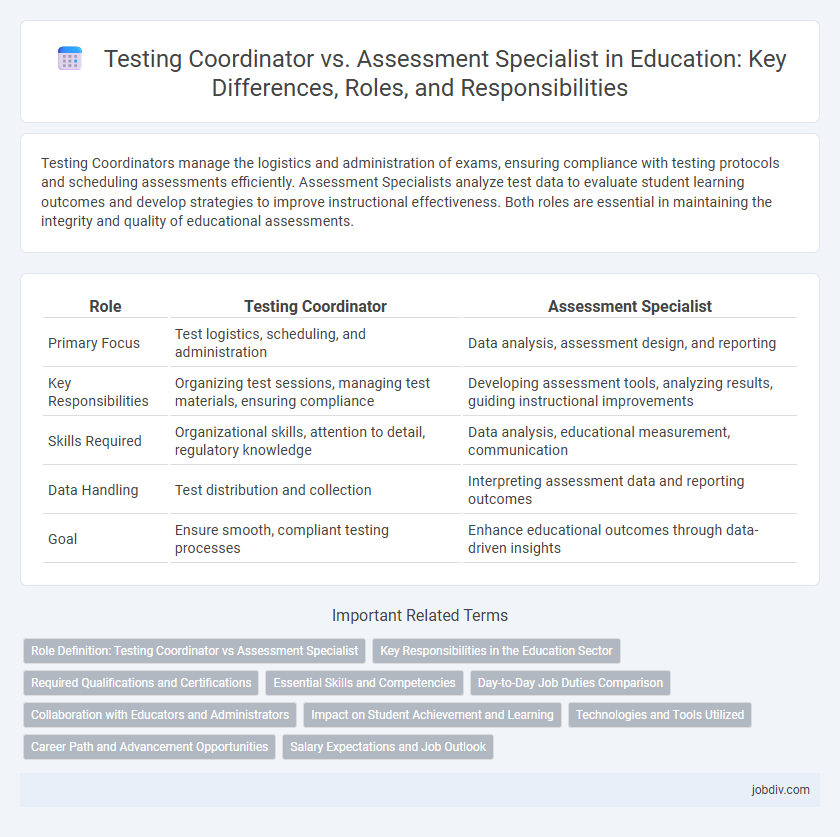Testing Coordinators manage the logistics and administration of exams, ensuring compliance with testing protocols and scheduling assessments efficiently. Assessment Specialists analyze test data to evaluate student learning outcomes and develop strategies to improve instructional effectiveness. Both roles are essential in maintaining the integrity and quality of educational assessments.
Table of Comparison
| Role | Testing Coordinator | Assessment Specialist |
|---|---|---|
| Primary Focus | Test logistics, scheduling, and administration | Data analysis, assessment design, and reporting |
| Key Responsibilities | Organizing test sessions, managing test materials, ensuring compliance | Developing assessment tools, analyzing results, guiding instructional improvements |
| Skills Required | Organizational skills, attention to detail, regulatory knowledge | Data analysis, educational measurement, communication |
| Data Handling | Test distribution and collection | Interpreting assessment data and reporting outcomes |
| Goal | Ensure smooth, compliant testing processes | Enhance educational outcomes through data-driven insights |
Role Definition: Testing Coordinator vs Assessment Specialist
A Testing Coordinator oversees the logistical planning, scheduling, and administration of standardized tests to ensure compliance with district and state regulations. An Assessment Specialist focuses on analyzing test data, interpreting results, and advising educators on instructional strategies and student performance improvements. Both roles are critical in supporting effective assessment management but differ in operational versus evaluative expertise within educational institutions.
Key Responsibilities in the Education Sector
Testing Coordinators manage the administration of standardized tests, ensuring compliance with district, state, and federal regulations while coordinating schedules, training proctors, and handling test materials securely. Assessment Specialists analyze student data to develop effective evaluation tools, interpret results, and provide actionable insights to improve instructional strategies and student outcomes. Both roles collaborate to maintain the integrity of testing processes and support data-driven decision-making in educational settings.
Required Qualifications and Certifications
Testing Coordinators often require a bachelor's degree in education or a related field, along with certification in test administration or educational measurement, such as the Certified Testing Administrator (CTA) credential. Assessment Specialists typically need advanced knowledge in psychometrics or educational assessment, frequently holding a master's degree in education, psychology, or measurement and evaluation, with certifications like the Certified Educational Evaluator (CEE) enhancing their qualifications. Both roles demand strong organizational skills and familiarity with standardized testing protocols, but Assessment Specialists focus more on data analysis and test design, requiring specialized certifications in assessment technologies.
Essential Skills and Competencies
Testing Coordinators excel in organizational skills, managing testing logistics, scheduling, and ensuring compliance with district and state policies, requiring proficiency in data management systems and communication. Assessment Specialists demonstrate expertise in data analysis, test interpretation, and educational measurement, essential for developing valid assessments and supporting instructional decisions. Both roles demand strong attention to detail, collaboration with educators, and a deep understanding of assessment frameworks to improve student outcomes.
Day-to-Day Job Duties Comparison
Testing Coordinators manage the logistics of organizing exams, ensuring compliance with testing policies, scheduling test sessions, and coordinating with staff and vendors. Assessment Specialists analyze test data to interpret student performance, develop assessment tools, and provide insights for instructional improvement. Both roles collaborate to enhance testing accuracy and educational outcomes but differ in operational versus analytical focus.
Collaboration with Educators and Administrators
Testing Coordinators collaborate closely with educators and administrators to organize and implement testing schedules, ensuring compliance with district and state regulations. Assessment Specialists work alongside teachers and school leaders to analyze test data, provide insights on student performance, and support instructional improvements. Both roles require strong communication and teamwork to enhance assessment accuracy and educational outcomes.
Impact on Student Achievement and Learning
Testing coordinators organize and administer standardized tests, ensuring compliance with district and state regulations, which provides accurate data for evaluating student achievement trends. Assessment specialists design and interpret assessments tailored to curriculum goals, enabling targeted interventions that address individual student learning gaps. Both roles are critical in improving educational outcomes by aligning testing procedures with effective instructional strategies to support student growth.
Technologies and Tools Utilized
Testing Coordinators primarily manage test logistics using platforms like Pearson Access Next and TestNav to administer standardized assessments effectively. Assessment Specialists leverage data analysis tools such as Tableau and Excel to interpret test results and support instructional improvements. Both roles utilize student information systems (SIS) and secure browsers to ensure accurate and secure testing environments.
Career Path and Advancement Opportunities
Testing coordinators typically manage standardized testing logistics, focusing on administration and compliance, which positions them for roles in educational operations or school administration. Assessment specialists analyze and interpret testing data to improve educational outcomes, offering advancement into data-driven instructional design and curriculum development. Both career paths offer growth in educational leadership, with assessment specialists often gaining a competitive edge through expertise in data analytics and educational research.
Salary Expectations and Job Outlook
Testing Coordinators typically earn an average salary ranging from $45,000 to $60,000 annually, reflecting their role in organizing and administering standardized tests within educational institutions. Assessment Specialists command slightly higher salaries, often between $55,000 and $75,000, due to their expertise in designing, analyzing, and interpreting student performance data. The job outlook for both positions is positive, with growing demand driven by increased emphasis on data-driven instruction and accountability in education systems.
Testing Coordinator vs Assessment Specialist Infographic

 jobdiv.com
jobdiv.com